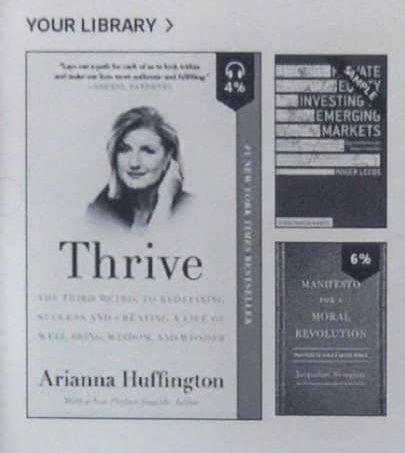“…If you find yourself lying in a pool of blood on your office floor, you are not successful.”
That was the opening quote by Dean Cohen, referencing Ms. Huffington’s book Thrive. I was on the edge of my seat, waiting to hear about terrible politics and foul play. Then, she explained that this was about her collapse from exhaustion in 2007 while her business was growing fast, she was on magazine covers and had been named one of the world’s 100 Most Influential People by Time. To add some more context, she had been an independent candidate for governor of California, running against Arnold Schwarzenegger in 2003, and founded The Huffington Post in 2005. Yes, I rushed to buy the e-book after the seminar, have flipped through some pages and look forward to finishing it. I also subscribed to the newsletter by Ms. Huffington’s more recent enterprise (thriveglobal.com).

The contrast between her public success and the toll on her well-being is similar to comparing my expectations of the seminar to what was being presented. But this was a surprisingly positive turn. While I was expecting a discussion of geopolitics, military strategies, soft power and diplomacy, which are frequently themes in other strong programming from the host institution (SAIS), the conversation focused on improving the way we live and work. Sleep, meditation and individual well-being were linked to positive leadership outcomes, public health and combating global inequalities, with the discussion still touching on US politics, China and Hong Kong. The turns in conversation reminded me of Dr. Nina Hall’s remarkable class at SAIS that introduced me to theories of international relations (IR), including practical feminist IR views in 2018 — diverse and relevant.
With my background in Africa-focused investing, I expected words like “remarkable” to apply to Dr. Chiedo Nwankwor’s Contemporary African Politics class, which exceeded my expectations. I did not expect to extend this sentiment to explorations of IR Theory then, but signing up for a seminar on “Global Disorder” at a time when we are all zoomed-out and this writing is evidence that I have been converted. Hopefully, this has piqued your interest. Here are some more interesting quotes from the seminar, with comments pointing to why I found them helpful. Happy reading!
“Athletes know that recovery is part of training… and we all need to learn from them.”
The discussion covered research and anecdotes on the necessity of sleep, including highlighting that, apart from about 1% of the global population with genetic mutations, the rest of us require 7–9 hours of daily sleep to function well. The conversation also referenced the concept of ‘sleep as a weapon of war’ pointing to bad military decisions that were made because leaders were burnt-out.
In continuing the discussion of burnout as another global epidemic, Ms. Huffington also discussed tools that could help us:
· recharge (sleep and take breaks),
· fuel (eat healthy),
· focus (reduce distractions), and
· connect (with ourselves and with others).
These include small changes such as deciding to not check our phones (which she called a nuclear weapon) during the first waking moments daily — even if for just 60 seconds to gather our thoughts. My personal target is longer than a minute but even when I feel most rushed, a short pause is still helpful.
Ms. Huffington sounded optimistic that the world is making progress despite the increasing numbers of devices/distractions we are faced with. She also referred to her business generating more traction from people who are interested in living better than people interested in politics. This indication of more attention being paid to well-being supports her view that lifestyles are improving on a grand scale.
The discussion pointed to her work being focused on providing people with practical tools to live and work better, and the increasing role of business as a platform for change in public health and other broad-reaching areas. This was particularly motivating for me because I started my career in the investment profession with a view to prepare for working in development via the public sector/international organisations. About 10 years later, I have found several opportunities for actively development-oriented work across roles in investment banking and private equity.
The conversation also showcased a bias to action, which is increasingly becoming a principle I choose to live by, and leads to the segment that I possibly found most inspiring:
“We need to recognise that everybody can change. Redemption is at the heart of social progress.”
Ms. Huffington referred to this understanding as being critical across multiple current issues. This includes the need for prisons to reform inmates (rather than be considered punishment as is often the case). She also spoke against ‘cancel culture’ in the workplace and in progressive social movements against racism and other forms of discrimination.
Reflecting on insights from the seminar, I close with a recommendation that we extend the belief in redemption to ourselves, in addition to others. We can take small (or big) steps and stay encouraged to recharge, fuel, focus, connect, make better/productive decisions and thrive.


